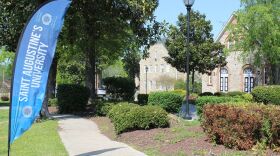The Southern Association of Colleges and Schools Commission on Colleges (SACSCOC) on Tuesday voted to revoke Saint Augustine’s University’s accreditation. But the move is not considered a “final action.”
At its meeting in Austin, Texas, SACSCOC noted that Saint Augustine’s had resolved all issues that caused the school to be placed on probation, except those related to finances. SAU will be able to present evidence that it has made progress toward those financial issues at the appeals hearing in February.
“While this may seem like a disappointing decision, we view this as an encouraging outcome that acknowledges our progress, and we are excited about the opportunity the appeal affords us,” said Marcus Burgess, interim president at St. Augustine’s.
SACSCOC also determined that, since the university had already indicated it would appeal today’s decision, it will remain accredited until the appeals committee makes a final decision.
That means students who graduate from SAU this December and in May 2025 will do so from an accredited university.
Universities must maintain accreditation from an approved accreditor to participate in federal student financial aid programs. If St. Augustine’s loses the appeal to SACSCOC or is unable to find another agency to grant accreditation, students could not receive federal aid or grants, effectively shutting the institution down.
St. Augustine’s University has been a member of SACSCOC since 1942.
This is the second time the agency has voted to remove SAU’s accreditation. The first was a year ago, also in December, when the SACSCOC board found SAU failed to meet several of its financial standards. This was later reaffirmed by the agency’s appeals committee.
In July, those decisions were overturned when an arbitration committee decided to give SAU a final chance to prove it had sound financial footing. In the months leading up to the accreditation hearing, SAU made several attempts to do so.
Attempts to reach financial stability

Saint Augustine’s University has touted several changes to its financial processes. This includes completing four audits from 2021 through 2024, developing a sustainability plan, and improving its finance-related procedures.
The university also entered multiple partnerships to help clear its millions of dollars in debt.
The HBCU signed two loan agreements, both secured with a deed of trust to university property. The larger of the two, a $7 million loan with a private firm called Gothic Ventures, was derided by critics of Saint Augustine’s leadership, calling the loan “predatory” and fearing it will be used to gentrify the campus’ downtown location.
The university also offered its land to Raleigh’s city council in a partnership with Shaw University. Both HBCUs proposed either leasing or selling their land to the city as part of a potential affordable housing project.
The HBCU also entered a partnership with a sports stadium development firm called 50 Plus 1 Sports. The collaboration comes with a $70 million “cash infusion” and will provide ongoing revenue streams, according to SAU. There’s been limited details released from SAU about what this partnership entails and what the university had to give up to access these funds.
Last month, Saint Augustine’s announced it was cutting 50% of its staff to strengthen its financial position ahead of the SACSCOC accreditation hearing. It said the cuts — which included staff, adjunct, and full-time faculty — helped the university save $17 million.
But all of these changes weren't enough to account for the university’s financial problems this year.
SAU’s turbulent financial year
Saint Augustine’s University started the 2023 school year under new leadership, after its Board of Trustees voted to fire the previous president amid the fight for its accreditation. The board elected Marcus Burgess to serve as the HBCU’s interim president.
Saint Augustine’s, however, failed to meet payroll for its faculty. In the months following, the HBCU also didn’t pay out some of its student refunds, had several outstanding balances with contractors, and faced nearly $10 million in tax liens from the IRS.
These financial troubles and the fight for its accreditation caused Saint Augustine’s to lose a decade-long early college contract with Wake County Public Schools. The HBCU also decided to send its own students home and cut the in-person spring semester short amid its financial challenges.
This fall, Saint Augustine’s University enrolled significantly fewer students than previous years. Only about 200 students make up the entire student body, down from about 870 in 2023.
About 76% of SAU’s students receive federal Pell Grants, according to data from a 2023 report from the Institute of Education Sciences.
“HBCUs tend to have higher proportions of their students who are relying on federal financial aid to pay their tuition bills, to pay for living costs,” said Edward Conroy, a higher education policy manager for a think tank called New America, whose research focuses on accreditation issues. “It’s usually pretty financially difficult to continue as an unaccredited institution.”
Historically, enrollment plummets after schools lose accreditation. Barber Scotia College, a private HBCU in Concord, lost its accreditation in 2004 and currently enrolls only about 10 students.
“You often end up with an (enrollment) spiral,” Conroy said. “Even if they still want to go to the school, if they can’t afford to pay without financial aid, then you often get students transferring out. And it’s harder to recruit new students if you’re not accredited.”
What’s next?

Saint Augustine’s University’s appeal of the SACSCOC decision will take place in February.
“The result of that hearing could be restoration of SAU’s accreditation without interruption,” said SAU Provost Janelle Jennings-Alexander said. “We are confident we have a good chance of ultimately prevailing, but we do not want students who are able to graduate now to go through a period of uncertainty unnecessarily.”
This is the second time the university has appealed a SACSCOC vote to revoke its accreditation. The HBCU has also been on probation before, back in 2018, for not meeting the board’s financial standards.
Another option could be to seek accreditation with a different agency.
Earlier this year, Interim President Burgess reached out to another accrediting agency — the Transnational Association of Christian Colleges and Schools (TRACS) — to discuss requirements for changing accreditors.
Switching accrediting agencies is a path several small HBCUs have taken after losing accreditation, including in North Carolina. TRACS in particular has been called a “lifeline” for these schools.
Just last year, Greensboro’s Bennett College became accredited by TRACS in the midst of its own SACSCOC accreditation fight. In 2018, a SACSCOC board voted to revoke the accreditation from the private women's HBCU after it failed several of the agency’s financial standards.
Similar to SAU, Bennett College filed a lawsuit against SACSCOC to retain its accredited status. In the meantime, the school began a new accreditation process with TRACS.
Universities accredited by TRACS are required to be Christian post-secondary institutions and have institutional faith statements that “clearly represent (its) religious identity."
Saint Augustine’s University is affiliated with the episcopal church and meets that initial threshold, but it would still take a while before the HBCU could be fully accredited by TRACS. The agency requires schools that have faced “adverse action” from another accreditor to wait one year before they can apply.
“Those limitations and waiting periods are in place to stop institutions from hopping from one agency to another to avoid being sanctioned,” Conroy said.
WUNC partners with Open Campus on higher education coverage.











